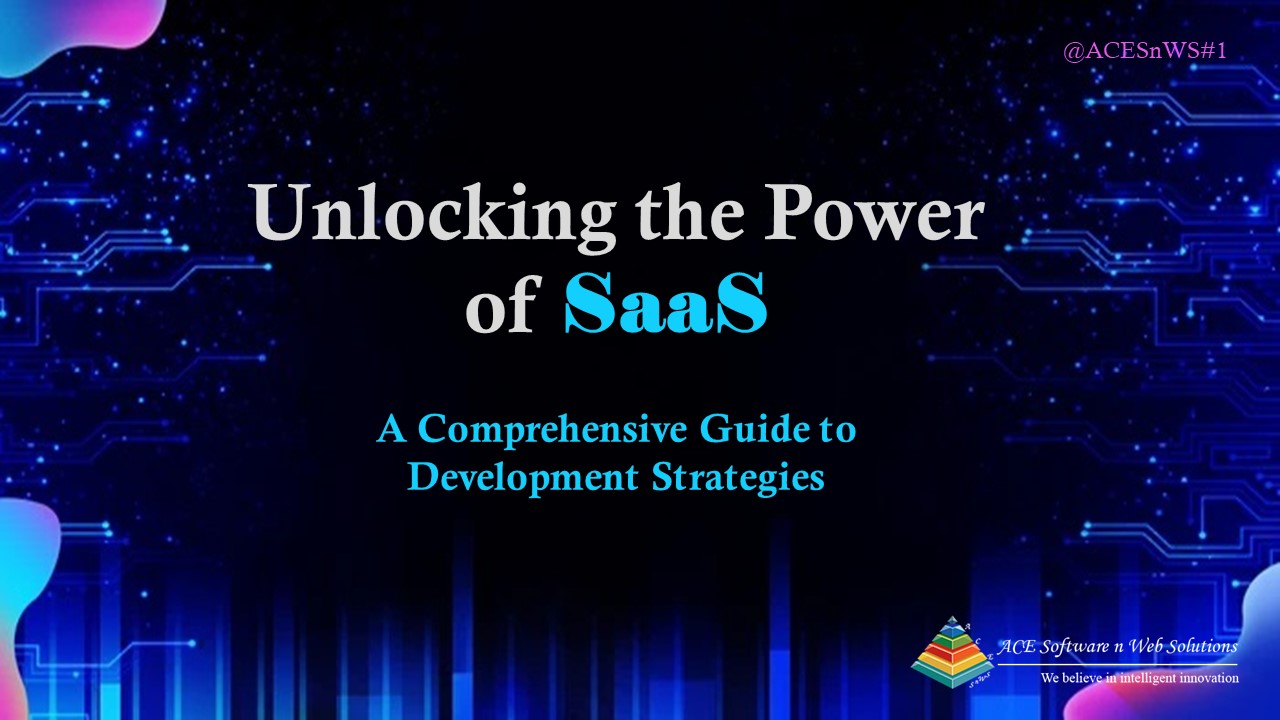
Unlocking the Power of SaaS: A Comprehensive Guide to Development Strategies for Manufacturing Industries
In today’s fast-paced business landscape, manufacturing industries are embracing Software as a Service (SaaS) solutions to streamline operations, enhance efficiency, and achieve a competitive edge. SaaS offers numerous advantages, from cost savings to scalability, making it a game-changer for the manufacturing sector. This comprehensive guide delves into SaaS development strategies tailored to manufacturing industries, helping businesses harness the full potential of SaaS solutions.
Why SaaS for Manufacturing?
- Cost-Efficiency: SaaS eliminates the need for on-premises infrastructure and reduces upfront costs
- Scalability: Easily adapt to changes in production demands without heavy investments
- Accessibility: Access critical data and applications from anywhere, fostering collaboration and remote work
- Up-to-date: SaaS providers handle updates and maintenance, ensuring you always have the latest features and security
Understanding Manufacturing-Specific Needs
Before diving into SaaS development, it’s crucial to understand the unique requirements of manufacturing industries:
- Enterprise Resource Planning (ERP) Systems: Cloud-based ERP solutions offer flexibility and scalability, allowing manufacturers to adapt to changing needs, and help manage various aspects of manufacturing, including production planning, inventory management, supply chain management, and financials
- Inventory Management Systems: Efficiently manage stock levels, preventing overstock or understock situations, help manufacturers optimize their inventory levels, reduce carrying costs, and improve demand forecasting
- Production Planning: Create accurate production schedules based on demand forecasts and resource availability
- Quality Management Systems (QMS): Implement rigorous quality checks at each production stage to ensure high-quality products, ensuring that products meet quality standards and compliance requirements. This is crucial in industries with strict quality control regulations
- Supply Chain Management (SCM): Seamlessly connect with suppliers and distributors for real-time data sharing, enhance visibility and collaboration within the supply chain, improving the coordination of suppliers, manufacturers, and distributors
- Customer Relationship Management (CRM): Manufacturers can benefit from CRM systems tailored to their specific needs, allowing them to manage customer relationships, sales, and after-sales support effectively
- Workflow Automation: Custom workflow automation solutions can reduce manual tasks, increase efficiency, and ensure standardized processes
SaaS Development Strategies
1. Tailored Solutions
- Customization: Develop SaaS solutions that meet your manufacturing needs, from tracking raw materials to managing finished goods
- Modular Design: Create a modular structure for easy updates and scalability
2. Data Analytics
- Real-time Data: Utilize sensors and IoT devices to collect real-time data for predictive maintenance and quality control
- AI and ML: Implement machine learning algorithms for predictive analytics and process optimization
3. Integration
- ERP Integration: Integrate SaaS with existing Enterprise Resource Planning (ERP) systems for seamless data flow
- Machine-to-Machine (M2M) Communication: Enable machines to communicate, facilitating autonomous decision-making
4. Security and Compliance
- Data Encryption: Ensure data security through robust encryption methods
- Regulatory Compliance: Adhere to industry-specific regulations, like ISO standards or FDA guidelines
5. Mobile Accessibility
- Mobile Apps: Develop mobile applications for remote monitoring and control of manufacturing processes
- Augmented Reality (AR): Implement AR for remote troubleshooting and training
6. Cloud Architecture
- Multi-Cloud Strategy: Diversify your cloud providers to ensure high availability
- Scalable Infrastructure: Opt for cloud services that scale automatically to meet demand
Benefits of SaaS
After adopting SaaS solutions manufacturing companies can see the significant change showcasing the tangible benefits like,
- Achieving a 20% increase in production efficiency through real-time data analytics and machine-to-machine communication
- Reducing inventory holding costs by 15% and improved on-time delivery by 25% by implementing SaaS inventory management
- Gaining a 30% increase in customer satisfaction with a streamlined process of SaaS CRM reducing redundancy and manual errors
Implementation Best Practices
- Pilot Testing: Begin with a small-scale implementation to identify and address any issues
- Employee Training: Ensure your workforce is proficient in SaaS tools and processes
- Continuous Improvement: Regularly assess and update your SaaS solutions to stay competitive
Unlocking the power of SaaS in manufacturing requires a strategic approach that considers industry-specific needs and focuses on customization, data analytics, integration, security, mobile accessibility, and cloud architecture. By adopting these development strategies, manufacturing industries can realize significant improvements in efficiency, cost savings, and competitiveness, ultimately propelling them into the future of manufacturing.
Investing in SaaS development is not just a business decision; it’s a strategic move that can reshape the future of manufacturing, making it more agile, efficient, and competitive in an ever-evolving global marketplace.




